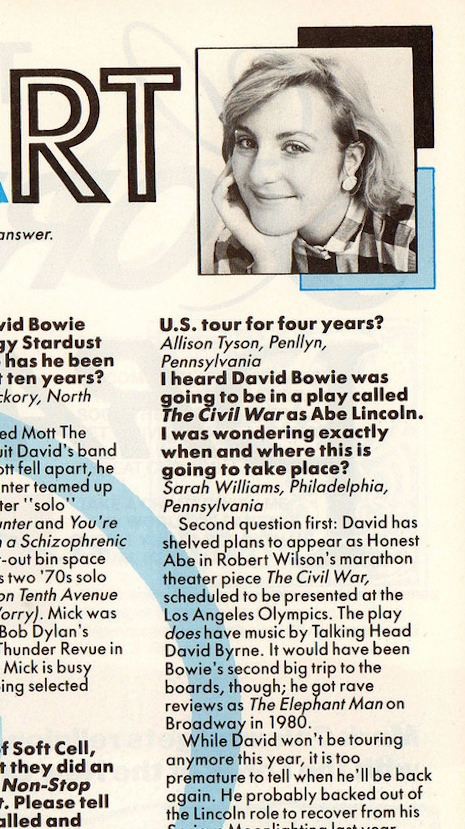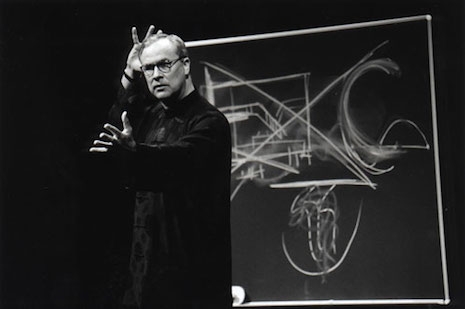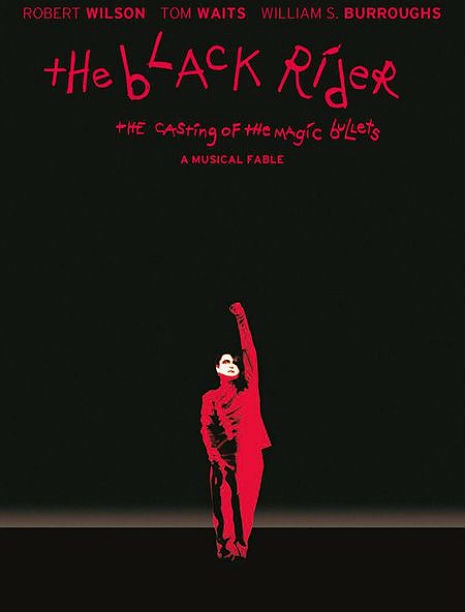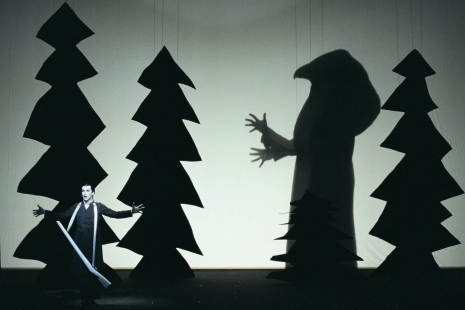
Today’s remarkable bit of David Bowie information comes from a somewhat unlikely source: the May 1984 issue of Star Hits, a fan magazine for teenagers that achieved the difficult feat of covering the Clash and Menudo on the same page.
Tucked between an announcement for a contest to win a “video six pack” featuring footage from Kajagoogoo and DEVO and a report on the Lords of the New Church the reader will find a monthly feature called “Get Smart,” an avowedly pre-internet page dedicated to answering music questions sent in from readers.

As you can see above, Sarah Williams of Philadelphia, Pennsylvania wanted to know this: “I heard David Bowie was going to be in a play called The Civil Wars as Abe Lincoln. I was wondering exactly when and where this is going to take place?”
The reigning matron of the “Get Smart” page, known as “Jackie,” provided this answer:
David has shelved plans to appear as Honest Abe in Robert Wilson’s marathon theater piece The Civil War, scheduled to be presented at the Los Angeles Olympics. The play does have music by Talking Head David Byrne. It would have been Bowie’s second big trip to the boards, though: he got rave reviews as The Elephant Man on Broadway in 1980.
Intriguing! I can’t improve on the reaction penned by the unnamed contributor to Retronaut (where I first saw this): “David Bowie was going to play Abe Lincoln… in a play with music by David Byrne… to be performed at the Los Angeles Olympics?.... What?”
“What?” indeed. Yes, it’s all true. In 1984 the Olympics were held in Los Angeles, and for reasons that aren’t too clear the experimental theater director Robert Wilson decided that an international collection of decathletes and volleyball players was the perfect occasion for a sprawling, challenging, 8-hour work called the CIVIL warS: a tree is best measured when it is down, to take place in six different world capitals. Wilson had already become renowned for his production of Philip Glass’ Einstein on the Beach and some years later would direct The Black Rider, Tom Waits and William S. Burroughs’ adaptation of a German folktale called “Der Freischütz.”
Here’s Wikipedia on the massive undertaking:
The Civil Wars was conceived as a single daylong piece of music theatre to accompany the 1984 Summer Olympics. Six different composers from six different countries were to compose sections of Wilson’s text inspired by the American Civil War. After initial premieres in their countries of origin, the six parts were to be fused in one epic performance in Los Angeles during the games, a parallel to the internationalist ideals of the Olympic movement.
The premiere of the full work was cancelled when funding failed to materialize (despite the Olympic Committee’s offer of matching funds) and deadlines were not met. But four of the six sections had full productions under Wilson’s direction in Minneapolis, Rome, Rotterdam and Cologne, with workshop productions of the other two sections in Tokyo and Marseille.
History professor Thomas J. Brown, in his book Remixing the Civil War: Meditations on the Sesquicentennial, notes that “plans for rock star David Bowie to deliver the Gettysburg Address in Japanese particularly troubled potential sponsors.” (Given any knowledge of Wilson’s previous work or the fact that the title of the thing was going to be styled the CIVIL warS in the first place, why exactly would Bowie reading the Gettysburg Address in Japanese trouble anyone?)

Robert Wilson
Interestingly, it does not appear that Lincoln reading the Gettysburg Address actually happened in the final work. The character of Lincoln did appear in one of the final works, that being the Rome section, which had its premiere in March 1984 at the Teatro dell’Opera di Roma, conducted by Marcello Panni. Lincoln was played not by Bowie but by Franco Sioli. Opera magazine published the following account of the piece’s action at the time—we’re just showing the Lincoln parts here:
The first scene presents Garibaldi in a box looking at the stage where a Snow Owl (Seta Del Grande) is seated; to the right a gigantic Abraham Lincoln (Franco Sioli) and at the centre Earth Mother (Ruby Hinds). ... The background to this episode depends on the vain efforts of Lincoln to enrole [sic] Garibaldi in the Federal army in 1862. The third scene is in a desert landscape: in the background is a spaceship and through a porthole we see a man floating in the absence of gravity: the man is Robert Lee, Confederate commander in chief. A mourning Mrs Lincoln (Ruby Hinds) enters followed by eight black-clothed figures (octet): the scene is conceived as a homage to the negro spiritual.
[Later] From a spaceship, Mrs Lincoln as a young girl recites an infantile speech announcing the end of the war. A human-sized Lincoln descends from the sky and reiterates the text sung in the first scene.
Human-sized Lincolns are my very favorite kind of Lincolns!
Keep reading after the jump…
Posted by Martin Schneider
|
04.04.2016
12:54 pm
|











